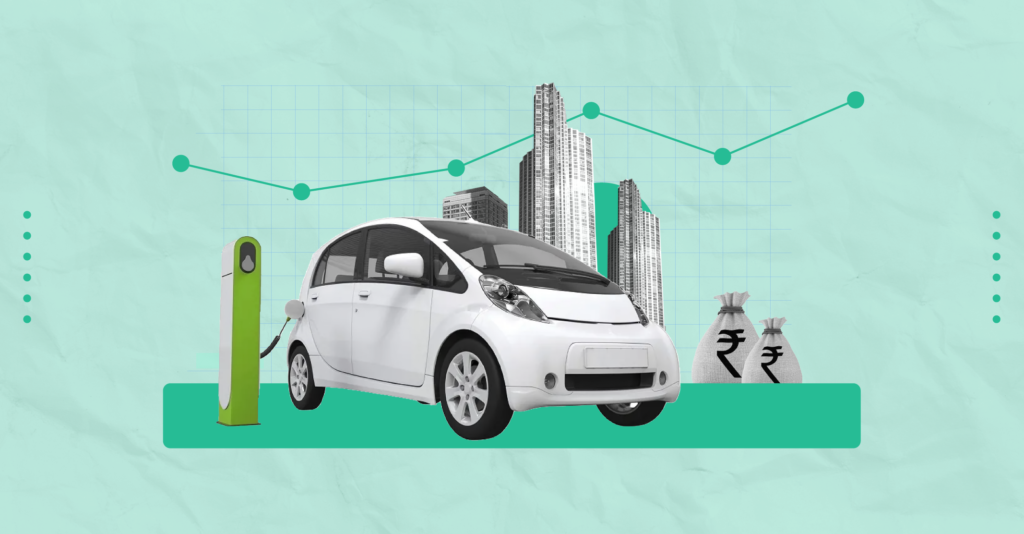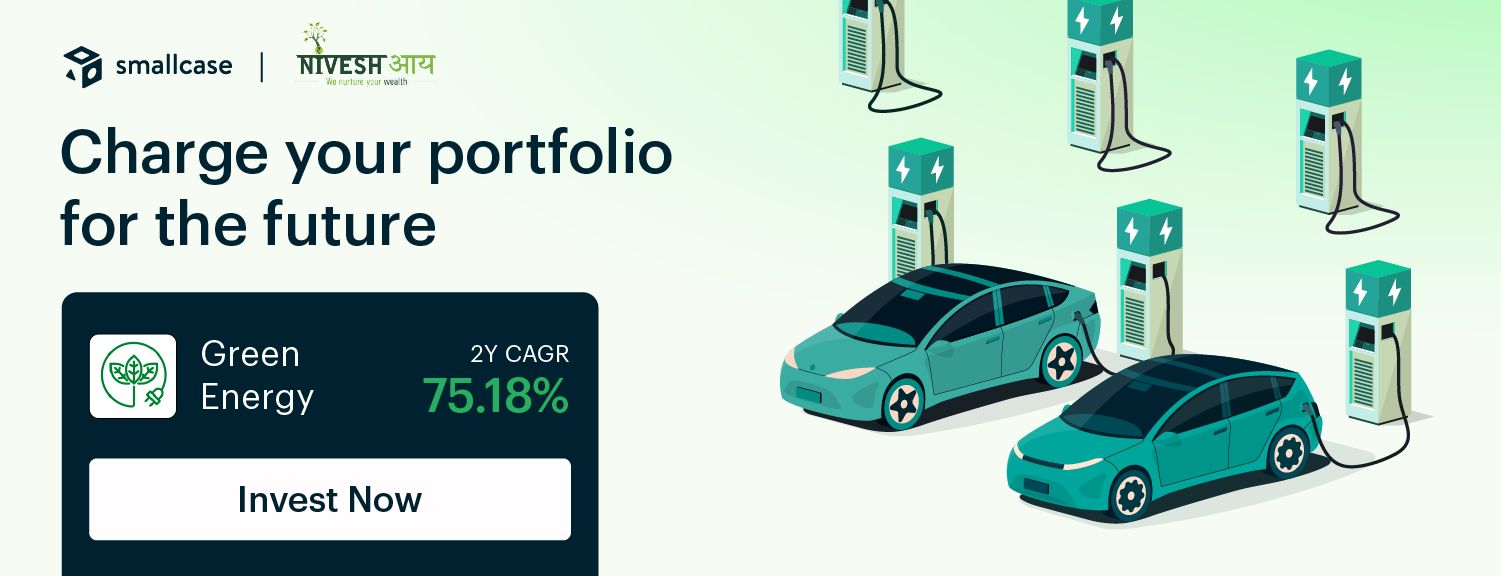Last Updated on Dec 12, 2024 by Vanessa Sequeira
The Indian EV market is on an impressive growth trajectory, expected to skyrocket from US$2 bn in 2023 to US$7.09 bn by 2025, aiming for 10 mn annual sales by 2030. The global electric vehicle market is forecasted to reach approximately $2,108.80 bn by 2033, growing at a significant CAGR of 23.42% from 2024 to 2033. This growth highlights the increasing interest in electric stocks in India, spanning from EV manufacturers in India like Tata Motors to battery giants like Exide.
In this article, let’s dive into the best EV stocks in India based on multiple factors: how they are invested in the electric vehicles sector, features of best EV companies, an overview of the EV sector in India, how to invest in the EV company stocks in India, and more.
Table of Contents
Best EV Stocks in India
| Name | Sub-Sector | Market Cap (in Cr.) | Close Price (Rs.) | PE Ratio | 1Y Return (%) |
| Mahindra and Mahindra Ltd | Four Wheelers | 3,63,411.35 | 3,073.00 | 32.25 | 85.99 |
| Maruti Suzuki India Ltd | Four Wheelers | 3,49,925.35 | 11,279.80 | 25.94 | 7.00 |
| Tata Motors Ltd | Four Wheelers | 2,90,098.96 | 798.75 | 9.24 | 10.81 |
| Bajaj Auto Limited | Two Wheelers | 2,51,308.11 | 9,077.45 | 32.60 | 47.88 |
| Vedanta Ltd | Metals – Diversified | 1,82,864.49 | 497.05 | 43.14 | 99.98 |
| Hyundai Motor India Ltd | Four Wheelers | 1,52,123.94 | 1,826.65 | 25.10 | 0.39 |
| Hindalco Industries Ltd | Metals – Aluminium | 1,48,256.52 | 670.90 | 14.60 | 28.43 |
| Eicher Motors Ltd | Trucks & Buses | 1,31,502.71 | 4,842.10 | 32.87 | 20.28 |
| TVS Motor Company Ltd | Two Wheelers | 1,19,571.79 | 2,488.85 | 70.90 | 28.80 |
| Samvardhana Motherson International Ltd | Auto Parts | 1,14,325.72 | 166.81 | 42.09 | 72.06 |
Note: The data is from 9th December 2024, and the top EV companies in India are sorted according to their 1Y return. The list is taken from Tickertape Stock Screener.
🚀 Pro Tip: You can use Tickertape’s Stock Screener to research and evaluate stocks with over 200+ filters and parameters.
Invest in the Best EV Stocks Selected by SEBI-Registered Analysts
Did you know that you can invest in readymade electric vehicle stock portfolios managed by SEBI-registered experts?
But, before that, let’s look at what smallcase is.
smallcases are modern investment products that help investors build low-cost, long-term & diversified portfolios with ease. A smallcase is a basket or portfolio of stocks/ETFs representing an idea – an objective, theme, or strategy. They are created and managed by SEBI-registered experts.
Among 500+ smallcases, here’s the top electric vehicle smallcase:
Disclosures for Electric Mobility smallcase
Disclosures for Green Energy smallcase
Note: The smallcase is mentioned only for educational purposes and are not meant to be recommendatory. Investors must conduct their own research and consult a financial expert before making any investment decisions.
Details of the Top EV Companies in India
A pioneer in the Indian automotive sector, Mahindra and Mahindra has been strengthening its position in the electric vehicle market with innovative offerings. Over the last five years, the company’s current ratio has stood at an impressive 130.36%, significantly outpacing the industry average of 105.5%. Additionally, the company has maintained a steady net profit margin of 7.91%, reflecting its robust financial health and operational efficiency. This makes it one of the best automobile stocks in India for investors looking at the growing EV segment.
Known for its dominance in the passenger vehicle segment, Maruti has demonstrated a strong financial foundation, with a debt-to-equity ratio of just 0.8% over the last five years, significantly lower than the industry average of 113.54%. Investors might find the stock appealing, given the expected return of 18.53% from the current price level, which surpasses its 3-year CAGR of 13.65%, showcasing its growth potential. With increasing interest in electric stocks in India, Maruti remains a key player to watch.
A leader in India’s EV space, Tata Motors is recognized for its extensive EV lineup and significant market share. Financially, the company has delivered a remarkable return on equity (ROE) of 43.1%, coupled with a net profit margin of 7.06%, highlighting its profitability and efficient operations. Motors is among the most prominent EV manufacturers in India, firmly positioned as one of the best EV sector stocks.
A key player in the two-wheeler EV segment, Bajaj Auto combines innovation with strong financial metrics. The company has maintained a stellar current ratio of 188.18% over the last five years, compared to the industry average of 137.2%, and a conservative debt-to-equity ratio of 1.69%, against the industry average of 27.77%. For investors looking into best automobile stocks in India, Bajaj Auto’s success in the EV segment makes it an attractive option.
While primarily known for its mining and resource-based operations, Vedanta is increasingly exploring renewable energy and EV-related materials. The company is poised for an expected earnings growth of 201.44% in the next year, a dramatic reversal from its 3-year CAGR earnings decline of -28.51%. Over the past five years, its debt-to-equity ratio has remained near the industry average at 118.55%, demonstrating balanced financial management. As a supplier of critical materials, Vedanta plays a pivotal role in the supply chain for EV manufacturers in India.
Best EV Stocks in India – Based on The Highest Daily Volume
| Name | Sub-Sector | Market Cap (in Cr.) | Close Price (Rs.) | PE Ratio | Daily Volume |
| Ola Electric Mobility Ltd | Two Wheelers | 41,005.30 | 92.25 | -25.88 | 4,03,74,883.00 |
| Samvardhana Motherson International Ltd | Auto Parts | 1,14,325.72 | 166.81 | 42.09 | 20,308,253.00 |
| Tata Motors Ltd | Four Wheelers | 2,90,098.96 | 798.75 | 9.24 | 1,53,41,371.00 |
| Vedanta Ltd | Metals – Diversified | 1,82,864.49 | 497.05 | 43.14 | 1,14,24,109.00 |
| Greaves Cotton Ltd | Industrial Machinery | 4,429.94 | 213.24 | -32.75 | 92,54,955.00 |
| Ashok Leyland Ltd | Trucks & Buses | 68,706.53 | 228.66 | 27.66 | 59,61,165.00 |
| Motherson Sumi Wiring India Ltd | Cables | 28,184.56 | 62.85 | 44.16 | 57,79,454.00 |
| Hindalco Industries Ltd | Metals – Aluminium | 1,48,256.52 | 670.9 | 14.60 | 50,60,121.00 |
| Exide Industries Ltd | Batteries | 38,649.50 | 467 | 44.09 | 37,35,946.00 |
| Mahindra and Mahindra Ltd | Four Wheelers | 3,63,411.35 | 3073 | 32.25 | 26,73,204.00 |
Note: The data is from 9th December 2024, and the top EV companies in India are sorted according to the highest daily volume. The list is taken from Tickertape Stock Screener.
Top EV Companies in India – Based on ROI
| Name | Sub-Sector | Market Cap (in Cr.) | Close Price (Rs.) | PE Ratio | Return on Investment (%) |
| Hyundai Motor India Ltd | Four Wheelers | 152,123.94 | 1826.65 | 25.10 | 54.08 |
| Motherson Sumi Wiring India Ltd | Cables | 28,184.56 | 62.85 | 44.16 | 34.38 |
| Cummins India Ltd | Industrial Machinery | 98,275.72 | 3509.15 | 57.12 | 25.94 |
| Bajaj Auto Limited | Two Wheelers | 251,308.11 | 9077.45 | 32.60 | 25.16 |
| Polycab India Ltd | Electrical Components & Equipments | 109,799.61 | 7438.4 | 61.55 | 22.52 |
| Eicher Motors Ltd | Trucks & Buses | 131,502.71 | 4842.1 | 32.87 | 21.94 |
| Bosch Ltd | Auto Parts | 103,760.54 | 35895.15 | 41.65 | 21.02 |
| Solar Industries India Ltd | Commodity Chemicals | 96,583.20 | 10962.9 | 115.54 | 20.71 |
| Tata Motors Ltd | Four Wheelers | 290,098.96 | 798.75 | 9.24 | 20.66 |
| Schaeffler India Ltd | Auto Parts | 56,329.50 | 3646.6 | 62.66 | 18.61 |
Note: The data is from 9th December 2024, and the list of top 10 EV companies in India are sorted from highest 5-yr return on investment to lowest. The list is taken from Tickertape Stock Screener.
Features of the Best EV Stocks in India
When evaluating the best EV shares in India, investors should focus on several key features that signal a company’s growth potential and stability in the evolving EV business in India.
- Innovative Product Lineup & Advanced Technology: A diverse and innovative range of EV products is offered by EV companies in India, including various vehicle types, that meet consumer needs and preferences. Emphasis on adopting and developing advanced technologies, especially in EV battery stocks, electric drivetrains, and vehicle software, to enhance performance. Among these, electric scooter listed companies in India are seeing particular growth in this segment.
- Strategic Industry Partnerships: Collaborations with tech firms, EV battery manufacturers, and other automakers to share knowledge, resources, and market access are crucial. These partnerships help companies strengthen their position among the top electric car manufacturing companies in India and the broader EV sector penny stocks in India.
- Government Support: Companies that benefit from government incentives, subsidies, and supportive policies aimed at accelerating EV adoption are often found in the best EV stocks lists. EV penny stocks in India may also benefit from such policies.
- Commitment to R&D: Ongoing investment in research and development helps drive technological advancements and maintain a competitive edge in the market. This factor is particularly important for electric vehicles manufacturers in India. R&D is also vital for crafting the best EV vehicles in India to meet future consumer expectations.
- Sustainability Practices: Active engagement in sustainability and environmental responsibility, including efforts to minimise the environmental impact of production, is a strong indicator of long-term success for electric vehicle battery stocks in India.
The Growth of Electric Vehicles in India
Once considered a distant dream, electric vehicle stocks in India have emerged as one of the fastest-growing segments in India’s automotive sector by 2023. This shift is driven by evolving public perception, heightened awareness of pollution from internal combustion engine vehicles, and the introduction of more desirable and efficient EV products.
Since 2021, India has witnessed a steady increase in EV adoption, with sales skyrocketing by 82% in March 2023 alone, reaching 1,39,789 units compared to the previous year. In May 2024, EV sales surged by 20.88%, reaching 1.39 million units, highlighting the growing acceptance of sustainable mobility. Complementing this demand is the development of public EV charging infrastructure, with 12,146 operational charging stations nationwide as of February 2024. Maharashtra leads with the highest number of charging stations, followed by Delhi and other states, underscoring regional strides in the EV business in India.
The market’s financial prospects are equally impressive. According to Fortune Business Insights, the Indian EV market, valued at US$ 3.21 billion in 2022, is projected to grow to US$ 113.99 billion by 2029, reflecting a staggering compound annual growth rate (CAGR) of 66.52%. This growth trajectory is supported by significant investments and commitments from both private companies and the government.
The government’s proactive policies, such as the mission for 30% electric mobility by 2030 and customs duty exemptions on capital goods for lithium-ion battery manufacturing, have further fueled the sector’s expansion. These initiatives aim to make electric vehicles manufacturers in India more accessible and sustainable in the long run, setting India on a transformative path toward clean energy and reduced carbon emissions
Advantages of Investing in EV Sector Stocks
Investing in the electric vehicle (EV) sector presents a range of advantages, especially as global energy trends shift towards sustainability.
Growth Potential
Electric share price NSE reflects the exponential growth in this industry, driven by increasing environmental concerns and government policies promoting cleaner energy sources. As traditional automotive markets stagnate, the EV sector share list promises significant expansion potential.
Government Incentives
Many governments worldwide, including India, are offering various incentives, such as tax rebates, grants, and subsidies for both electric car manufacturing companies in India and consumers. This makes electric vehicle stocks in India a part of attractive investment opportunities.
Environmental Impact
Investing in EV stocks India aligns with growing consumer and corporate emphasis on sustainability. By supporting the growth of the best EV sector stocks in India, investors contribute to the reduction of greenhouse gas emissions and pollution. It also aligns their portfolios with global sustainability goals and the growth of the emergence of the best EV in India.
Market Diversification
The best automobile stocks in India includes not just automakers but also battery manufacturers, charging infrastructure providers, and technology firms. This diversity allows investors to spread their risks across various sub-sectors within electric scooter listed companies in India. It enhances portfolio diversification, including EV penny stocks in India and electric vehicle related stocks in India.
Regulatory Support
With increasing environmental regulations aimed at reducing carbon emissions, the EV sector stocks are likely to benefit from stricter emission standards imposed on traditional combustion vehicles. These regulations can accelerate the shift toward electric vehicles, boosting the market share of EV companies in India.
Early-Mover Advantage
For investors, investing in the top EV stocks in India early can be seen as an early-mover advantage, especially in regions where EV adoption is just beginning to take off. Investing in the best EV shares in India before they become mainstream can potentially yield higher gains as the sector matures.
Consumer Adoption Rates
As consumer preferences shift towards more sustainable and technologically advanced vehicles, the demand for electric vehicles is expected to continue rising. This growing consumer base will likely drive sales volumes and, in turn, the stock prices of companies within the EV sector, including the best EV stocks in India.
Risks Associated With Investing in EV Stocks
Investing in electric vehicle (EV) stocks carries several risks that investors should consider. Understanding these risks can help make more informed investment decisions in this rapidly evolving EV industry.
- Technological Obsolescence: Companies that fail to keep up with technological advancements risk becoming obsolete. New battery technologies and breakthroughs in charging infrastructure could render existing technologies outdated quickly. This directly impacts the electric scooter share price list and the broader electric vehicle share list.
- High Competition: The EV market has attracted many new entrants alongside established automotive giants pivoting towards electric models. This heightened competition can pressure profit margins and market share and ultimately affect the financial stability of companies, especially smaller players in EV penny stocks in India or any EV cars company vying for prominence.
- Supply Chain Volatility: The best automobile stocks in India heavily rely on specific raw materials like lithium, cobalt, and nickel, essential for battery production. Fluctuations in the availability or price of these materials can affect production costs and timelines, posing risks for EV battery stocks. Geopolitical tensions and environmental regulations can also disrupt supply chains, affecting companies with exposure to EV stocks list.
- Market Valuation Concerns: The hype surrounding the EV market can lead to inflated valuations that do not necessarily reflect the underlying economic fundamentals of companies. Such overvaluation can result in volatility and sharp price corrections if investor sentiment shifts or if companies fail to meet growth expectations. This is a particular concern for EV penny stocks list and the EV stock price.
Who Can Invest in the Best EV Stocks in India?
Investors interested in long-term growth within the EV sector may find the best EVs in India an appealing opportunity.
- Those comfortable with higher risk and market fluctuations might be drawn to companies listed among the biggest electric vehicle manufacturers in India.
- Investors passionate about sustainable transportation and green energy could be attracted to this sector.
- Those fascinated by technological advancements in EV batteries and charging stations might see the potential here.
- Investors looking to diversify their existing portfolios might consider adding electric vehicle shares.
- Those comfortable with navigating the uncertainties of a developing industry might be interested in EV stocks.
- Early adopters who see the potential in transformative industries might prefer companies offering the best EVs in India, combining innovation with profitability.
How to Identify the Best EV Stocks in India?
Identifying the best EV stocks in India involves analysing several critical factors that indicate a company’s potential for growth, sustainability, and profitability within the emerging EV market. Here’s what you might consider when evaluating the top EV stocks in India:
- Diverse Product Portfolio
Identify companies with a wide range of EV products, including passenger vehicles, commercial vehicles, two-wheelers, and three-wheelers. Diversifying across EV solar and AI shares in India may provide additional growth opportunities within the emerging electric vehicle market.
- Innovative Technology
Focus on companies leading in EV technology, enhancing vehicle performance, safety, and user experience. Such firms are often featured prominently in the best electric vehicle stocks list.
- Robust Supply Chain and Manufacturing
Look for EV company shares with strong supply chains for essential components and scalable manufacturing processes. These are critical for maintaining a competitive edge and meeting rising demand, especially among electric vehicle stocks in India.
- Financial Health
Assess companies with steady revenue, profitability, and positive cash flow, which enable ongoing R&D and strategic growth. Many top EV stocks in India also overlap with EV penny stocks, catering to investors seeking high-growth opportunities.
- Sustainability Initiatives
Consider companies committed to using renewable energy in manufacturing and reducing their carbon footprint, as these are significant factors for electric vehicle-related stocks in India and EV sector stocks.
- Customer Base and Network
Firms providing reliable support and accessible charging infrastructure often see greater consumer adoption, strengthening their position in the best EV sector stocks list.
- Export Potential
Companies expanding globally open additional growth avenues, increasing their resilience. Export-focused firms frequently lead in the EV sector shares category and feature in lists like the top electric vehicle stocks.
By analysing these aspects, investors can identify the best EV stocks in India, whether targeting any electric scooter listed company in india or exploring opportunities in EV penny stocks for speculative growth.
How to Invest in Electric Vehicle (EV) Stocks in India?
If you are looking to invest in EV stocks in India, here’s a simple guide using a stock screener:
Step 1: Go to the Tickertape Stock Screener.
Step 2: Click on ‘+ Create’ in the ‘Stock Universe’ section to set up your stock universe.
Step 3: Add electric vehicle stocks in India by including companies that are mentioned in reliable articles or lists, focusing on those directly involved in the EV sector.
Step 4: Apply over 200 filters available on the platform to sort and analyse these stocks based on your investment preferences, such as market capitalisation, financial health, or growth potential.
Step 5: Review the filtered list, focusing on key metrics like electric vehicle share price, revenue growth, and technological innovation, to identify the stocks that best fit your criteria.
A thorough analysis of the stock is worthwhile before adding it to your portfolio. For this purpose, Tickertape provides you with comprehensive research, analysis, and investing tools. With Tickertape Stock Screener, you can list stocks based on your preferred criteria. There are over 200 filters for you to choose from, along with pre-built screens, which make your analysis faster.
Further, the Scorecard on every asset page helps you dive deeper into the stock and analyse the stock based on quantitative factors such as profitability, performance, entry and exit points, valuation, and growth and provides a sneak peek into the potential red flags in the stock. Research, analyse, and invest quicker than before because #TickertapeHaiNa! Become a Pro Member now!
To Wrap Up
The electric vehicle (EV) sector in India is rapidly expanding, bringing lots of opportunities for people looking to invest. However, the dynamic nature of this sector, characterised by swift technological evolutions and regulatory changes, underscores the importance of conducting thorough research before making any investment decisions. By being careful and making informed choices, you can make the most out of the growing EV market in India and help support a cleaner environment.
Frequently Asked Questions on EV Stocks
1. Which companies in India are providing 2-wheeler electric vehicles?
2. Which companies in India are providing 4-wheeler electric vehicles?
Several 4-wheeler manufacturers in India are providing electric vehicles. Tata Motors, Mahindra Electric, Hyundai, and Ultraviolette Automotive are well-known names and more.
3. What are the EV battery stocks in India?
Some of the electric vehicle battery stocks in India are Exide Industries, Amara Raja Batteries, Tata Chemicals, Hero MotoCorp, Maruti Suzuki, Himadri Speciality Chemical Ltd, etc.
4. What are the EV charging station stocks in India?
Some EV charging stocks in India are TATA Power Company Ltd, Power Grid Corporation of India Ltd, Indian Oil Corporation Ltd (IOCL), etc.
5. Who should invest in EV sector stocks?
Stocks in the EV sector are a good match for investors drawn to green technology and long-term growth prospects and who are aware of the risks involved. It’s important to make sure these investments fit with your own goals and how much risk you’re willing to take. Before putting your money into these stocks, carefully assess your risk appetite and investment goals.
6. Are there any EV penny stocks in India?
Tunwal E-Motors Ltd is one of the EV penny stocks in India. As of 10th December 2024, its share price stands at Rs. 48.45.
7. Which are the top EV two-wheeler companies in India?
Ola Electric, TVS Motor and Ather Energy are some of the top EV two-wheeler companies in India.
Explore other popular stock collections on Tickertape –
Here’s are some of the popular stock collections across different sectors in India:





